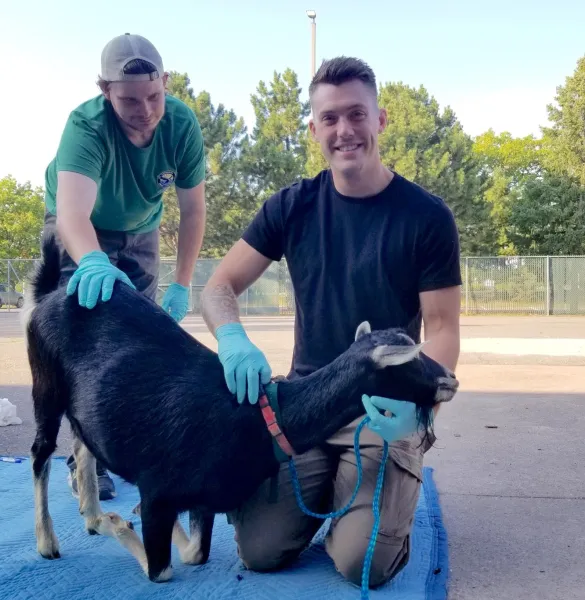A diverse group of Northern Michigan University biology students and professionals from state and federal wildlife agencies recently learned how to safely and ethically tranquilize animals during a three-day professional development course in wildlife chemical immobilization and handling at NMU.
“We have a fisheries and wildlife major in biology, so there are a number of situations where future wildlife biologists might need to immobilize wildlife to put on radio collars or translocate animals to an area where there aren't any to reintroduce the population,” said John Bruggink, NMU faculty liaison for the course.
“It's a skill set that every wildlife biologist will use at some point in their career. This training doesn't necessarily make you ready to go out on your own and work with wildlife without an experienced biologist who's been doing it for a while, but at least you have the background knowledge and understand the effects of the different drugs. It's a nice thing to have on the resume that you don't get as part of the normal curriculum.”
The course also provided continuing education hours for the Ecological Society of America Certification, The Wildlife Society Professional Developmental Program and RACE Approved for Veterinarian and Veterinary Technicians.
“The classroom portion of the course covers a whole range of topics, from ethics to the different types of immobilizing drugs and reversing drugs, and different ways to handle different sorts of animals,” said Bruggink. “You have to monitor them pretty carefully when they're anesthetized because you're responsible for keeping them alive. You're monitoring the vital signs and learn what to do if they get too hot or cold or stop breathing. The outdoor part involved practice shooting targets with the dart guns; technically, they're called projectors now.”
Anthony Clyne, a fisheries and wildlife management major, was the local coordinator for the course. He works as a wildlife student assistant for the Bear, Furbearer and Small Game Specialist of the Michigan DNR. He contacted state and federal agencies and universities to gather supplies and form a group for the course. As a perk for his efforts, he was able to participate in the course for free.
“In order to properly apply a GPS collar, take morphological measurements or blood samples for wildlife research, we sometimes have to immobilize the animals,” said Clyne. “We use a specific drug combination that is predetermined for the species we are working with."
Clyne's favorite exercise was the goat lab. Bruggink said the course used locally rented goats because they provide a good model for deer. They are both ruminants, or animals with four stomachs. An individual must be careful because the animal may aspirate their stomach contents if not positioned right when immobilized. Participants were divided into six groups, with a goat per group. They anesthetized the goats and monitored their temperature, pulse and respiration (TPR). Then, a reversal drug combination was administered to bring the goats out of anesthesia.
"I'm focused on carnivore ecology and spatial use. Hopefully, in the fall, I'll be pursuing a master's degree,” said Clyne. “Right now, with this certification, it's really beneficial for state and federal agency employees in order to conduct research. For nuisance animals such as problem bears, this certification allows professionals to immobilize and relocate properly. There are a lot of practical applications.”
Clyne and Bruggink said they believe that future courses like the wildlife immobilization and handling course would be beneficial and a learning experience for the students at NMU.
Global Wildlife Resources (GWR) was founded by Dr. Mark Johnson, a wildlife veterinarian. He offered the course with a limited number of 30 openings. Labs ran from 9 a.m. to 5 p.m., with participants practicing chemical immobilization, drug delivery systems, needle and syringe skills, blood collection, and preparing live animals for immobilization. Additional course content included euthanasia, drug dose calculations, legal responsibilities, patient monitoring, human safety and more.
Learn more about NMU's fisheries and wildlife management major here.

